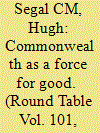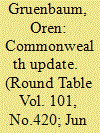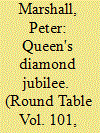| Srl | Item |
| 1 |
ID:
114196


|
|
|
|
|
| Publication |
2012.
|
| Summary/Abstract |
In this, one of his earliest public addresses as Canada's Special Envoy for Commonwealth Renewal, the author explains the basis of his country's relationship with the Commonwealth and stresses the need for urgent and sustained action on the recommendations of the Eminent Persons Group if the full potential of this association of nations is to be realised. He commends the progress that has already been made in a number of areas, but argues that unless the focus on human rights, democracy and the rule of law is maintained, the Commonwealth may not be able to maintain its reputation as a compelling force for good.
|
|
|
|
|
|
|
|
|
|
|
|
|
|
|
|
| 2 |
ID:
114191


|
|
|
|
|
| Publication |
2012.
|
| Summary/Abstract |
There was little progress in negotiations over the disputed ousting of former president Mohamed Nasheed in the Maldives. In a landmark ruling, the former Liberian president Charles Taylor was found guilty of aiding war crimes and crimes against humanity in Sierra Leone's civil war. Malawi's vice-president Joyce Banda succeeded President Bingu wa Mutharika despite an apparent coup attempt by the brother and ministers of the late Mutharika. There were hopes of a 'Malaysian spring' as record numbers of protesters took to the streets. Pakistan's supreme court found the prime minister, Yousaf Raza Gilani, guilty of contempt of court. The kingdom of Barotseland declared it was seeking to secede peacefully from Zambia.
|
|
|
|
|
|
|
|
|
|
|
|
|
|
|
|
| 3 |
ID:
114193


|
|
|
|
|
| Publication |
2012.
|
| Summary/Abstract |
Divorce legislation was enacted in Malta in 2011 following a consultative referendum. Until then the biggest barrier to divorce had been the perceived influence of the Catholic Church, expressed not just in its presence in many spheres of public life, but in historical reminders of the political costs of challenging its status and doctrines. The process leading to the introduction of divorce showed: that the political parties still feared confronting the Church; that the Church itself had been losing ground as a politically coercive or persuasive force; and that the biggest challenge to its status and relevance was coming from below, as a result of people's changing attitudes and lifestyle. This contrasts starkly with the history of Church-State relations and its landmark political-religious conflicts, involving the ecclesiastical establishment on the one hand, and secularising political forces on the other. Retracing the history of political-religious strife, this paper seeks to evaluate the changing quantity and quality of ecclesiastical power in Malta, up to the point when the divorce question exposed its limits, though not its end.
|
|
|
|
|
|
|
|
|
|
|
|
|
|
|
|
| 4 |
ID:
114194


|
|
|
|
|
| Publication |
2012.
|
| Summary/Abstract |
This paper discusses the contemporary sovereignty experience of small states and territories in the context of unfolding 'strategy games'. This paper charts and illustrates some of the most salient issues over which this dynamic is played out, using binary (small state versus big state) relations as its analytic constituency. These practices are understood as part of the evolution of the conduct of government, or governmentality, as envisaged by Michel Foucault: states, no longer concerned with threats to their very existence, can flex their clout extra-territorially, and in so doing provide new and creative opportunities, but also raise threats, for the exercise of sovereignty.
|
|
|
|
|
|
|
|
|
|
|
|
|
|
|
|
| 5 |
ID:
114195


|
|
|
|
|
| Publication |
2012.
|
| Summary/Abstract |
The 1985 Commonwealth Heads of Government Meeting, meeting in the Bahamas, established an Eminent Persons Group to encourage dialogue towards the establishment of a non-racial and representative government in South Africa. The Group visited South Africa and met with leaders of the front-line states, government ministers and black leaders in South Africa and African National Congress leaders in exile. Its report was published as a Penguin Special in June 1986, reputedly the fastest book ever published and an immediate best-seller. The report painted a damning picture of apartheid and galvanised calls for full economic and financial sanctions. It demonstrated the distinctive strengths of the Commonwealth in world affairs.
|
|
|
|
|
|
|
|
|
|
|
|
|
|
|
|
| 6 |
ID:
114192


|
|
|
|
|
| Publication |
2012.
|
| Summary/Abstract |
The Queen's Diamond Jubilee occasions a recognition of her unique contribution to the development of the Commonwealth, especially the pervasive theme of service. The author also reflects on the role of faith in a multicultural and perhaps increasingly secular society. The Jubilee is, he argues, an occasion to look forward as well as back with clear heads and warm hearts.
|
|
|
|
|
|
|
|
|
|
|
|
|
|
|
|